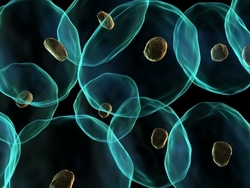The Laws of Cell Theory
 Which of the following is
not
one of the three main laws of cell theory?
Which of the following is
not
one of the three main laws of cell theory?
A. All cells reproduce to form new cells.
B. The cell is the most basic unit of life.
C. All living organisms are composed of one or more cells.
D. Cells come only from pre-existing cells.
This section requires Javascript.
You are seeing this because something didn't load right. We suggest you, (a) try
refreshing the page, (b) enabling javascript if it is disabled on your browser and,
finally, (c)
loading the
non-javascript version of this page
. We're sorry about the hassle.
THE CELL THEORY
Cells were not discovered until the advent of the microscope. Robert Hooke saw the empty chambers in a cork sample, and gave them the name of cells. Later Anton Van Leeuwenhoek saw the first living cell. A cell is defined as 'A speck of nucleated protoplasm, bounded be a plasma membrane, which is able to perform all vital functions' . It is the basic structural and functional unit of life.
.
Three scientists working independently, all played a role in the formation of today’s cell theory.
M. Schleiden – “Plants are aggregates of fully individualized, separate beings.”
T. Schwann – “Animals are also made of cells and proposed a cellular basis of life.”
R. Virchow – “Animals arise only from an animal, and plants only from a plant.”
.
The combined work of those three is known as the cell theory. It consists of the three following principles.
Cells are the basic unit of life.
All organisms are composed of cells.
All cells arise from preexisting cells.
.
All cells arise from preexisting cells, but it is not necessary for every preexisting cell to give rise to new cells. For example, our memory cells do not divide at all.
( In biology, division and multiplication are the same things. If a cell multiplies, it has divided, and vice-verse .... hope this helps!! @Finn Hulse are you following me?)